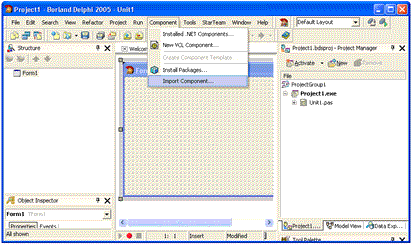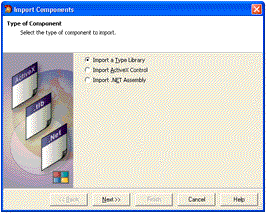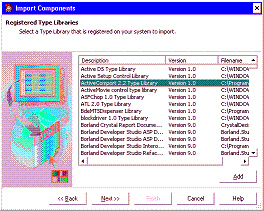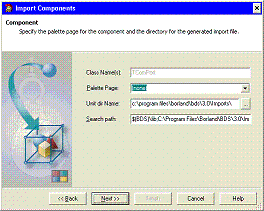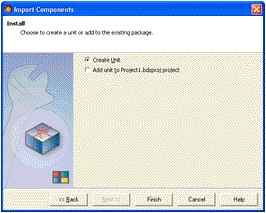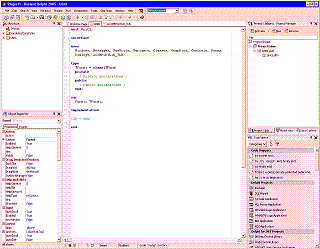Using ActiveXperts Serial Port Component with Delphi
ActiveXperts Serial Port Component is a software development kit (SDK) that enables the user to communicate to a device over a serial interface.
Such a device can be: a weight indicator, a modem, a scanner, or any other device that is equiped with a serial port. It can even be another PC, connected via a NULL modem cable.
ActiveXperts Serial Port Component features the following:
- Direct COM port support (like 'COM1')
- TAPI (Windows Telephony Device) support (like 'Standard 56000 bps Modem');
- Support for RS-232/RS422/RS485, up to 256 simultaneous ports;
- Support for all types of Hayes compatible modems;
- Support for serial cable as well as USB cable or Bluetooth connections;
- Support for Virtual COM ports (i.e. COM ports redirected through the network);
- Hardware flow control (RTS/CTS, DTR/DSR) and software flowcontrol (XON/XOFF) support;
- Configurable baudrate/parity/stopbits, full buffered data transfer, text/binary data transfer.
Step 1: Download and install the ActiveXperts Serial Port Component
Download the ActiveXperts Serial Port Component from the ActiveXperts Download Site and start the installation. The installation guides you through the installation process.
Step 2: Create a new Delphi Project
Launch Delphi from the Start menu. Choose 'New' from the 'File' menu and select your preferred kind of application, for instance: 'VCL Forms Application - Delphi for Win32'. A new Form is displayed in the workspace.
(Click on the picture to enlarge)
Step 3: Refer to the ActiveXperts Serial Port Component Library and create the objects
Now that a new project has been created, you must add a reference to Serial Port Component in the project to be able to use the ActiveXperts Serial Port Component object. To do so, choose 'Import Component...' from the 'Component' menu. The Import Components' dialog appears. Select 'Import a Type Library':
(Click on the picture to enlarge)
In the 'Registered Type Libraries' page, select 'Serial Port Component 2.2 Type Library' and click 'Next':
(Click on the picture to enlarge)
In the 'Components' page, leave all fields default and click 'Next':
(Click on the picture to enlarge)
In the 'Install' page, select 'Create Unit' and click 'Next':
(Click on the picture to enlarge)
The interface code is generated now and is shown in the AXSERIAL_TLB tab of the project.
Step 4: Declare and create the object
From the Project Manager, open Unit1.bas and add the AXSERIAL_TLB to the 'Uses' statement to refer to the ActiveXperts Serial Port Component library:
(Click on the picture to enlarge)
In the 'private' or 'public' section, declare the following objects:
objComport : IComPort
You can now create the objects, for instance in the 'FormCreate' function:
objComPort := TComPort.Create(Form1).DefaultInterface;
Step 5: Send an AT command to a connected Hayes compatible modem
You can now send and/or receive data to and/or from a serial port.
The following code shows how to query a modem:
unit Unit1;
interface
uses
Windows, Messages, SysUtils, Variants, Classes, Graphics, Controls, Forms,
Dialogs, AxSerial_TLB, ShellAPI, StdCtrls, ExtCtrls;
type
TForm1 = class(TForm)
GroupBox1: TGroupBox;
Label1: TLabel;
Label2: TLabel;
comboDevice: TComboBox;
comboSpeed: TComboBox;
Label3: TLabel;
comboFormat: TComboBox;
Label4: TLabel;
comboHwFlow: TComboBox;
Label5: TLabel;
comboSwFlow: TComboBox;
buttonOpen: TButton;
buttonClose: TButton;
GroupBox2: TGroupBox;
Label6: TLabel;
Label7: TLabel;
editData: TEdit;
checkDTR: TCheckBox;
checkRTS: TCheckBox;
buttonSubmit: TButton;
Label8: TLabel;
Label9: TLabel;
GroupBox3: TGroupBox;
editReceived: TMemo;
Label10: TLabel;
GroupBox4: TGroupBox;
checkCTS: TCheckBox;
checkDSR: TCheckBox;
checkDCD: TCheckBox;
checkRI: TCheckBox;
GroupBox5: TGroupBox;
Label11: TLabel;
Label12: TLabel;
Label13: TLabel;
editResult: TEdit;
editLogfile: TEdit;
Button2: TButton;
Timer1: TTimer;
procedure FormCreate(Sender: TObject);
procedure buttonOpenClick(Sender: TObject);
procedure buttonCloseClick(Sender: TObject);
procedure buttonSubmitClick(Sender: TObject);
procedure Timer1Timer(Sender: TObject);
procedure Button2Click(Sender: TObject);
procedure checkDTRClick(Sender: TObject);
procedure checkRTSClick(Sender: TObject);
private
objComport : IComport;
procedure EnableControls ();
function GetResult () : Integer;
function GetTempDirectory () : String;
public
{ Public declarations }
end;
var
Form1: TForm1;
implementation
{$R *.dfm}
procedure TForm1.FormCreate(Sender: TObject);
var numDevices : Integer;
var i : Integer;
begin
objComport := CoComport.Create ();
comboDevice.Items.Add( 'COM1' );
comboDevice.Items.Add( 'COM2' );
comboDevice.Items.Add( 'COM3' );
comboDevice.Items.Add( 'COM4' );
numDevices := objComport. GetDeviceCount ();
for i := 0 to numDevices do begin
comboDevice.Items.Add( objComport.GetDevice( i ));
end;
comboDevice.ItemIndex := 0;
comboSpeed.Items.Add('Default');
comboSpeed.Items.Add('110');
comboSpeed.Items.Add('300');
comboSpeed.Items.Add('600');
comboSpeed.Items.Add('1200');
comboSpeed.Items.Add('2400');
comboSpeed.Items.Add('4800');
comboSpeed.Items.Add('9600');
comboSpeed.Items.Add('14400');
comboSpeed.Items.Add('19200');
comboSpeed.Items.Add('28800');
comboSpeed.Items.Add('33600');
comboSpeed.Items.Add('38400');
comboSpeed.Items.Add('56000');
comboSpeed.Items.Add('57600');
comboSpeed.Items.Add('115200');
comboSpeed.Items.Add('128000');
comboSpeed.ItemIndex := 0;
comboFormat.Items.Add('Default');
comboFormat.Items.Add('n,8,1');
comboFormat.Items.Add('e,7,1');
comboFormat.ItemIndex := 0;
comboSwFlow.Items.Add('Default');
comboSwFlow.Items.Add('Enabled');
comboSwFlow.Items.Add('Disbaled');
comboSwFlow.ItemIndex := 0;
comboHwFlow.Items.Add('Default');
comboHwFlow.Items.Add('Enabled');
comboHwFlow.Items.Add('Disbaled');
comboHwFlow.ItemIndex := 0;
EnableControls ();
GetTempDirectory ();
end;
{////////////////////////////////////////////////////////////////////////////////}
function TForm1.GetTempDirectory: string;
var Buffer: array[0..MAX_PATH] of Char;
begin
GetTempPath(SizeOf(Buffer) - 1, Buffer);
editLogfile.Text := StrPas(Buffer) + 'Pop3Log.txt';
end;
{////////////////////////////////////////////////////////////////////////////////}
procedure TForm1.EnableControls ();
var bEnabled : Boolean;
begin
if objComport.IsOpened = -1 then bEnabled := true else bEnabled := false;
buttonOpen.Enabled := Not bEnabled;
buttonClose.Enabled := bEnabled;
buttonSubmit.Enabled := bEnabled;
editData.Enabled := bEnabled;
checkDTR.Enabled := bEnabled;
checkRTS.Enabled := bEnabled;
editReceived.Enabled := bEnabled;
end;
{////////////////////////////////////////////////////////////////////////////////}
function TForm1.GetResult : Integer;
begin
Result := objComport.LastError;
editResult.Text := 'ERROR ' + IntToStr ( Result ) + ' : ' + objComport.GetErrorDescription( Result );
end;
{////////////////////////////////////////////////////////////////////////////////}
procedure TForm1.buttonOpenClick(Sender: TObject);
begin
objComport.Device := comboDevice.Text;
if ( comboSpeed.Text <> 'Default' ) then begin
objComport.BaudRate := StrToInt ( comboSpeed.Text );
end;
if comboFormat.ItemIndex = 1 then begin
objComport.StopBits := objComport.asSTOPBITS_1;
objComport.Parity := objComport.asPARITY_NONE;
objComport.DataBits := objComport.asDATABITS_8;
end;
if comboFormat.ItemIndex = 2 then begin
objComport.StopBits := objComport.asSTOPBITS_1;
objComport.Parity := objComport.asPARITY_EVEN;
objComport.DataBits := objComport.asDATABITS_7;
end;
objComport.HardwareFlowControl := comboHwFlow.ItemIndex;
objComport.SoftwareFlowControl := comboSwFlow.ItemIndex;
objComport.ComTimeout := 100;
objComport.LogFile := editLogfile.Text;
objComport.Open ();
if GetResult () = 0 then begin
EnableControls ();
end;
end;
{////////////////////////////////////////////////////////////////////////////////}
procedure TForm1.buttonCloseClick(Sender: TObject);
begin
objComport.Close ();
if GetResult () = 0 then begin
EnableControls ();
end;
end;
{////////////////////////////////////////////////////////////////////////////////}
procedure TForm1.buttonSubmitClick(Sender: TObject);
begin
objComport.WriteString( editData.Text );
end;
{////////////////////////////////////////////////////////////////////////////////}
procedure TForm1.Timer1Timer(Sender: TObject);
var Buffer : WideString;
begin
if ( objComport.IsOpened = -1 ) then begin
if ( objComport.QueryCTS () = -1 ) Then
checkCTS.Checked := true
else
checkCTS.Checked := false;
if ( objComport.QueryDSR () = -1 ) Then
checkDSR.Checked := true
else
checkDSR.Checked := false;
if ( objComport.QueryDCD () = -1 ) Then
checkDCD.Checked := true
else
checkDCD.Checked := false;
if ( objComport.QueryRI () = -1 ) Then
checkRI.Checked := true
else
checkRI.Checked := false;
Buffer := objComport.ReadString ();
if Length ( Buffer ) > 0 then begin
editReceived.Lines.Add(Buffer);
end;
end;
end;
{////////////////////////////////////////////////////////////////////////////////}
procedure TForm1.Button2Click(Sender: TObject);
var LogFile : PAnsiChar;
begin
LogFile := StrNew(PChar(editLogFile.Text));
ShellExecute ( 0, 'open' , LogFile, '', '', SW_SHOW )
end;
{////////////////////////////////////////////////////////////////////////////////}
procedure TForm1.checkDTRClick(Sender: TObject);
begin
if objComport.IsOpened = -1 then begin
if checkDTR.Checked = true then
objComport.RaiseDTR( 1 )
else
objComport.RaiseDTR( 0 );
GetResult ();
end;
end;
{////////////////////////////////////////////////////////////////////////////////}
procedure TForm1.checkRTSClick(Sender: TObject);
begin
if objComport.IsOpened = -1 then begin
if checkRTS.Checked = true then
objComport.RaiseRTS( 1 )
else
objComport.RaiseRTS( 0 );
GetResult ();
end;
end;
{////////////////////////////////////////////////////////////////////////////////}
end.
There are many working samples included with the product. You can also find them on the ActiveXperts FTP site: ftp.activexperts-lab.com/samples/serial-port-component.

